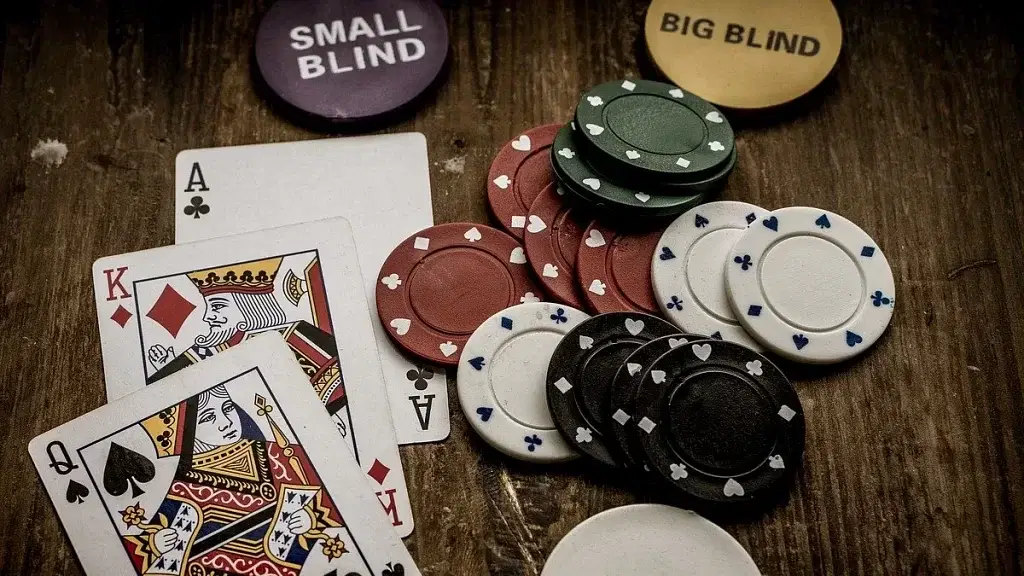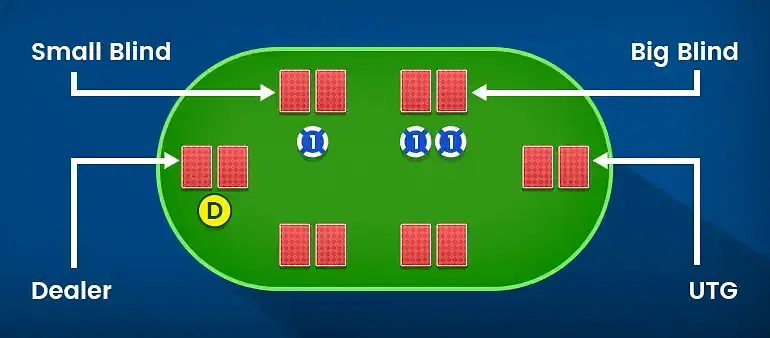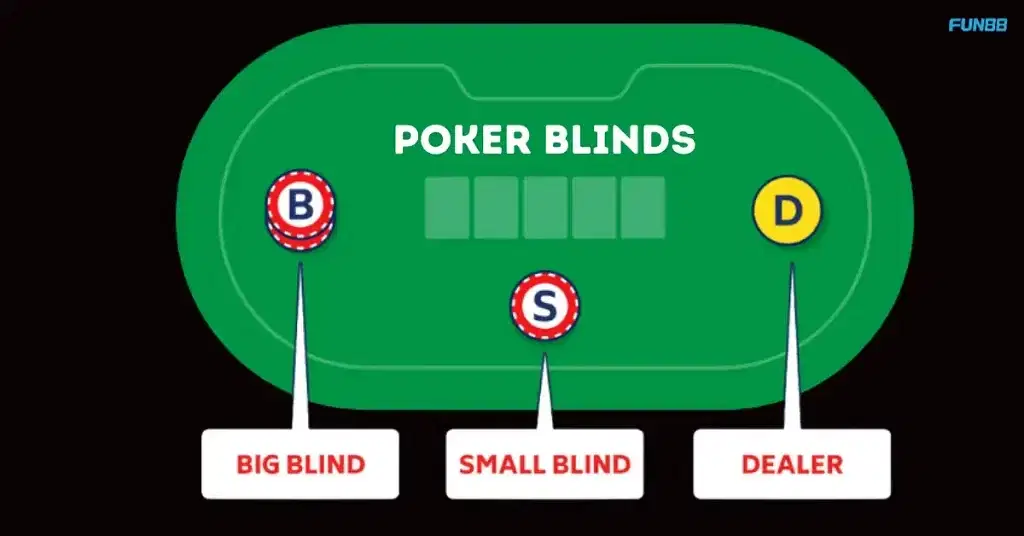Have you ever sat at a Poker table, glanced at the forced bets called blinds, and wondered about their significance? What purpose do they serve in a game that could technically allow players to wager without such prerequisites? Let’s unravel the details of Poker blinds, exploring their foundational role in the game and how they influence player strategies.
What Are Poker Blinds?

In poker, particularly in popular variants like Texas Hold’em and Omaha, blinds are a critical component. Essentially, a blind is a mandatory bet that players must place before they even see their hands. This mechanism establishes an initial pot that players can compete for, transforming the game from a passive activity into a dynamic battle of wits and skill.
Two Types of Blinds: Small and Big

Poker usually features two blinds:
- Small Blind (SB): This is the lesser of the two bets and is typically placed by the player immediately to the left of the dealer button.
- Big Blind (BB): As the name suggests, this is double the small blind and is placed by the player sitting next to the small blind.
In a Poker cash game, blinds remain constant. However, in tournaments, these blinds increase at regular intervals, compelling players to adapt or risk elimination.
Why Are Poker Blinds Necessary?
Blinds serve multiple purposes in the game of poker:
- Creating a Pot: By requiring a monetary commitment before the cards are dealt, blinds ensure there is always money in the pot for players to fight over. This norm alters the approach players take, encouraging a competitive spirit.
- Encouraging Participation: Without blinds, players might adopt a wait-and-see strategy, only entering pots with premium hands. With forced bets, there’s a reason to play more hands, making the game more thrilling.
- Shaping Strategy: The position of each player relative to the blinds significantly impacts their strategy. For example, early-position players must tackle the risks of engaging with fewer potential insights into other players’ hands.
The Structure of the Game

Understanding how blinds function is crucial for effective play. In every hand, the dealer button rotates clockwise. This movement of the button ensures that every player, at some point, assumes the role of the small or big blind. This mechanism aims to level the playing field.
Upon receiving their cards, players respond to the action based on the blinds:
- The first wagering round starts with the player next to the big blind, who can fold, call, or raise.
- By the end of each hand, the initial investments made through blinds further shape the dynamics of wagering.
Related Read: What is Full House Poker Hand Ranking?
Understanding how to approach the blinds effectively can greatly enhance a player’s overall strategy in poker. Here’s how players can tackle these crucial aspects:
Playing from the Blinds: The Positional Disadvantage

Players who post blinds are often at a distinct disadvantage since they must commit money without knowing their cards. This positional challenge means that players in the blinds should be selective about the hands they choose to play:
- Small Blind Strategy: Players should be cautious and avoid committing too many chips without a solid hand. It’s often advisable to fold speculative hands unless the pot already holds considerable value.
- Big Blind Approach: From the big blind seat, players may choose to defend their position more frequently due to the potential for favourable pot odds. However, caution is still essential, especially against aggressive opponents.
Employing Agility in Tournaments
In tournament play, the significance of blinds intensifies. As the blinds escalate at predetermined intervals, players must adjust their strategies to ensure survival:
- Stay Aggressive: With increasing blinds, waiting for premium hands can lead to stagnation. Adopting an aggressive style can help accumulate chips and deter opponents.
- Adapt to Stack Sizes: Players should constantly assess their chip stacks relative to the blinds. A small stack requires a more urgent approach, while a larger one allows for more tactical plays.
Related Read: Ultimate Poker Cheat Sheet – Quick Tips for Success
Dealing with Missed Poker Blinds
Players can miss their blinds due to absences or choosing to sit out. The consequences are twofold:
- Posting Missed Blinds: If a player misses their blinds, they must either post the total amount of missed blinds when they rejoin or wait until it’s their turn to play again.
- Dead Blinds: If a player misses the small blind, it’s considered ‘dead’ for the purpose of future bets.
This structure ensures players cannot exploit favourable positions by skipping out on blinds.
The Evolution and Variations of Poker Blinds
As poker has evolved, so have the strategies and structures surrounding blinds. Different formats and games now utilise blinds uniquely, each adding flavour to the strategy. For instance, some games have introduced multiple blinds or “straddle” bets, which can significantly alter dynamics.
New Formats: The Straddle
In many cash games, players can opt to place a straddle bet, which is an additional blind made before cards are dealt. This bet is usually double the big blind and can significantly boost the stakes before any action occurs. Here’s how straddles work and their implications:
- Straddle Dynamics: The player who straddles acts last in the first wagerng round, creating an additional layer of strategy. It invites players to raise or call with a wider range of hands, knowing that a larger pot size has already been established.
- Encouraging Aggression: By enabling straddles, the game becomes more aggressive. Players may feel compelled to raise or bluff more often, leading to increased pots and higher risks. It’s not uncommon for the game’s pace to accelerate dramatically, with more players entering hands than they typically would without straddle bets.
The Double Blind Concept
While the traditional small and big blinds remain standard, some high-stakes Poker Games implement a double-blind structure, meaning two big blinds can be posted in certain rounds. This mechanism creates even more action as players tackle additional forced bets that contribute to larger pots.
- Strategic Depth: The presence of multiple blinds means players need to adjust their strategies accordingly. Especially in positions where they’re normally considered safe, they must evaluate the increased cost of entering pots. A player with a strong hand might feel pressured to act, while a player with speculative holdings may choose to fold pre-flop out of fear of being overly committed.
Poker Blind Psychological Warfare
Beyond their mathematical implications and strategic considerations, blinds also play a crucial role in the psychological aspects of poker. The presence of blinds introduces elements of intimidation, posturing, and misdirection, creating a rich tapestry of interactions at the table.
Reading Opponents: The Psychological Edge
When sitting in the blinds, players often face the challenge of “reading” their opponents. The size and actions of blinds can give insights into players’ intentions. A player who consistently raises from a late position can reveal their confidence or even desperation as they try to exert pressure.
Behavioural Changes: Human psychology dictates that the money already invested can lead players to irrational decision-making. For example, a player who has posted a big blind may feel an urge to defend it aggressively, even with mediocre hands. Understanding these behavioural tendencies can give keen players an edge.
Bluffing and Deception

The forced nature of the blinds also paves the way for bluffing opportunities. A player can wield the power of the blinds to manipulate perceived gaming strength. For instance, if a player checks in the big blind after others have raised, they might induce further aggression from opponents attempting to steal the pot.
Creating Misdirection: Players who calculate their actions effectively can use the element of surprise to their advantage. A well-timed bluff can force opponents into difficult spots, even leading them to fold stronger hands. This psychological element amplifies the entertainment factor of poker, making each hand a thrilling contest not just of cards but of intellect.
Related Read: 5 Best Poker Card Shuffle Tricks You Should Know
Why Play Poker Online on Fun88?
Fun88 offers a secure and immersive online Poker experience for players of all levels. With an array of poker games tournaments, and promotions available, something exciting is always happening on the virtual felt.
Variety of Games – From Texas Hold’em to Omaha Hi-Lo, Fun88 provides a diverse selection of Poker games to suit every player’s preference. Players can also choose from different wagering limits, making it accessible for beginners and high rollers alike.
Generous Promotions – Fun88 offers generous bonuses and promotions for poker players, including welcome bonuses, weekly cashback, and loyalty rewards. These incentives make playing Poker on Fun88 even more rewarding.
Conclusion
Blinds serve as the lifeblood of poker, ensuring that games remain dynamic and engaging. They foster a competitive spirit and introduce an additional layer of strategy and decision-making that makes the game rich and fulfilling. By evolving into various forms, incorporating psychological elements of gameplay, and requiring players to think critically while building a foundation for their strategies, blinds encompass much of what makes Pokercaptivating.
With this knowledge, you can approach poker with greater confidence and expertise. Happy playing!
Star it if you find it helpful.

